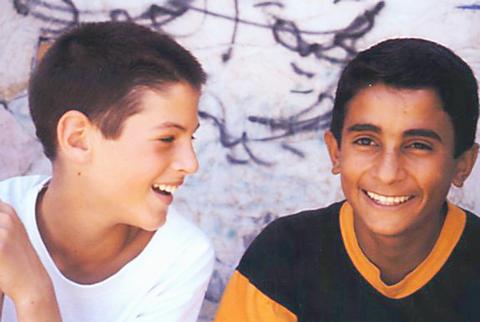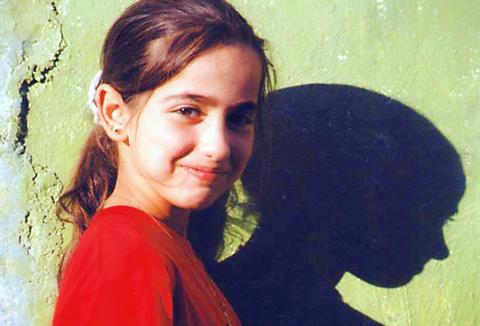From the opening scenes of Promises, a documentary screening in the Golden Horse Film Festival tomorrow about children who live on opposing sides of Israeli-Palestinian hostilities, it becomes clear that Israel is a land where childhood is short and innocence is hard to find.
In their pre-teen years, the 10 Jerusalem-area youngsters that the directors -- Justine Shapiro, B.Z. Goldberg and Carlos Bolado -- meet and interview over a three-year period have already become accustomed to violence and assumed many of the hatreds of the adult world.
Moishe, who lives in the Jewish settlement of Bet El in the West Bank, rides his bike along the chain-linked fence that keeps out feared Palestinian attackers to the local firing range, where he says with a smile, "it's okay if they miss, because they might hit an Arab."

A fiery young Palestinian boy, Faraj is no less belligerent, stating proudly that when he sees a Jew, he "wants to throw a rock at him ... to cut him in two." As we learn more about the children, we come to understand why they feel the way they do. The Jewish children speak with visible fear in their eyes of the genuine threat of terrorist attacks. Moishe's best friend was killed in such an attack. The Palestinian children, meanwhile, talk of the daily humiliation of checkpoints, relatives killed by Israeli troops and their lives under virtual siege in squalid bullet hole-ridden refugee camps.
One of the most emotional moments comes when a Palestinian girl named Sanabel tells how much she misses her father, who has been held in an Israeli jail for two years without trial and without formal charges being pressed against him. Sanabel is not clear on all the legal and political details of his detention -- her father is a hardline pro-PLO journalist -- but his missing her birthday, again, is more than she can bear.
These children's environment is one of uncertainty, fear and violence, which are ripe conditions for hatred to take root at an early age.

PHOTO COURTESY OF GOLDEN HORSE FILM FESTIVAL
But between the unbending statements by all the kids of their communities' historical right to the land of Israel and their mutual suspicion of the other sides' motives, the movie tries to portray the kids as just that -- kids.
The usually tough Faraj breaks down into tears when he fails to place first in a 100m sprint at a school race. Likewise, the secular Jewish twins Yarko and David cry when they lose their final volleyball match. And in a wonderfully silly scene, the ultra-orthodox Shlomo engages in a burping match with a Palestinian boy in the alleys of Jerusalem that leaves them both doubled over with laughter.
These episodes set the stage for Promises' most daring, and some would say controversial, stage, when director B.Z. Goldberg sets up a meeting between Yarko and David and the Palestinian children the team has been interviewing. It seems like a naive attempt at forcing reconciliation between two communities, and one almost expects a tragic outcome typical of the Middle East to counter the director's simplistic logic that kids will set everything right.

PHOTO COURTESY OF GOLDEN HORSE FILM FESTIVAL
As it turns out, children's games like pillow fights and soccer are the great equalizers and the kids get along famously after some stiff introductions and an uncomfortable tour around the refugee camp for the Jewish twins. By the time Yarko and David get back in the car for the short trip back to Jerusalem, they've made a bunch of new friends and provided enough footage of communal good feeling to almost inspire a new peace process. The next time we meet the kids, however, two years have gone by and the twins have not seen Faraj or the other Palestinian friends they made that day. The political situation in Israel has deteriorated and the kids on both sides appear to have retrenched into their previous patterns of mistrust and hatred; whatever gains were made that day with Goldberg's authorial intervention seem to have disappeared.
Despite the apparent failure to seal the gap between the Jewish and Palestinian children, Promises shows that while the adults on both sides of the conflict appear incapable or unwilling to find common ground and live in peace, these kids managed to do just that, if only for a day. That is a rare message of hope in a place that increasingly seems hopeless.

This year will go down in the history books. Taiwan faces enormous turmoil and uncertainty in the coming months. Which political parties are in a good position to handle big changes? All of the main parties are beset with challenges. Taking stock, this column examined the Taiwan People’s Party (TPP) (“Huang Kuo-chang’s choking the life out of the TPP,” May 28, page 12), the Democratic Progressive Party (DPP) (“Challenges amid choppy waters for the DPP,” June 14, page 12) and the Chinese Nationalist Party (KMT) (“KMT struggles to seize opportunities as ‘interesting times’ loom,” June 20, page 11). Times like these can

June 23 to June 29 After capturing the walled city of Hsinchu on June 22, 1895, the Japanese hoped to quickly push south and seize control of Taiwan’s entire west coast — but their advance was stalled for more than a month. Not only did local Hakka fighters continue to cause them headaches, resistance forces even attempted to retake the city three times. “We had planned to occupy Anping (Tainan) and Takao (Kaohsiung) as soon as possible, but ever since we took Hsinchu, nearby bandits proclaiming to be ‘righteous people’ (義民) have been destroying train tracks and electrical cables, and gathering in villages

Dr. Y. Tony Yang, Associate Dean of Health Policy and Population Science at George Washington University, argued last week in a piece for the Taipei Times about former president Ma Ying-jeou (馬英九) leading a student delegation to the People’s Republic of China (PRC) that, “The real question is not whether Ma’s visit helps or hurts Taiwan — it is why Taiwan lacks a sophisticated, multi-track approach to one of the most complex geopolitical relationships in the world” (“Ma’s Visit, DPP’s Blind Spot,” June 18, page 8). Yang contends that the Democratic Progressive Party (DPP) has a blind spot: “By treating any

Swooping low over the banks of a Nile River tributary, an aid flight run by retired American military officers released a stream of food-stuffed sacks over a town emptied by fighting in South Sudan, a country wracked by conflict. Last week’s air drop was the latest in a controversial development — private contracting firms led by former US intelligence officers and military veterans delivering aid to some of the world’s deadliest conflict zones, in operations organized with governments that are combatants in the conflicts. The moves are roiling the global aid community, which warns of a more militarized, politicized and profit-seeking trend